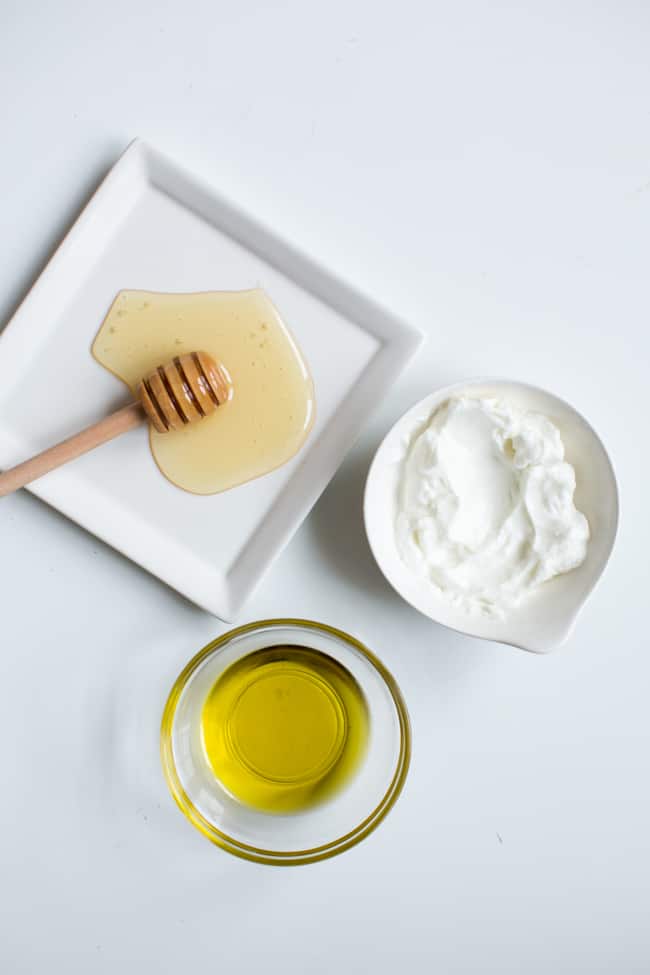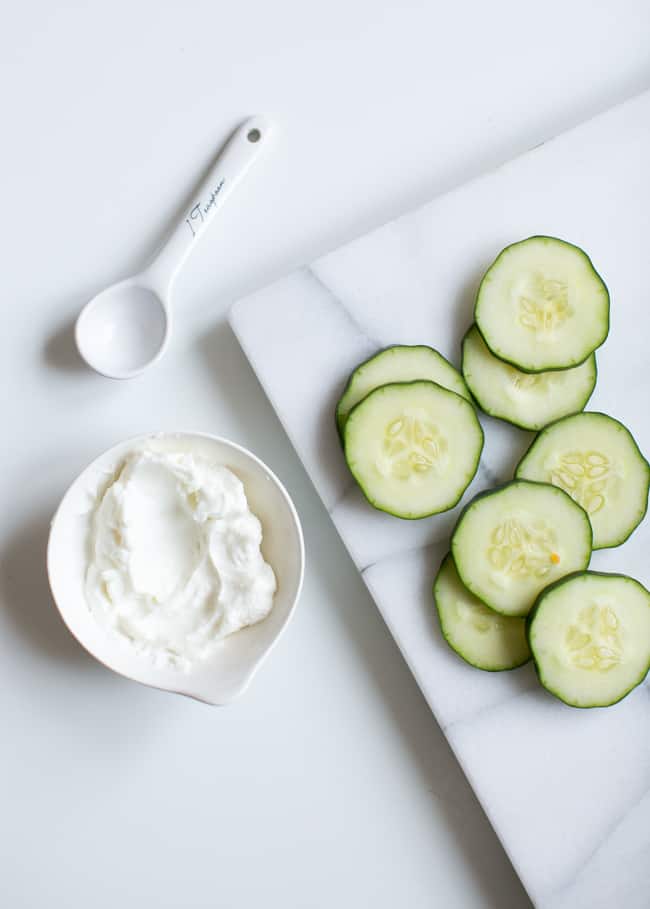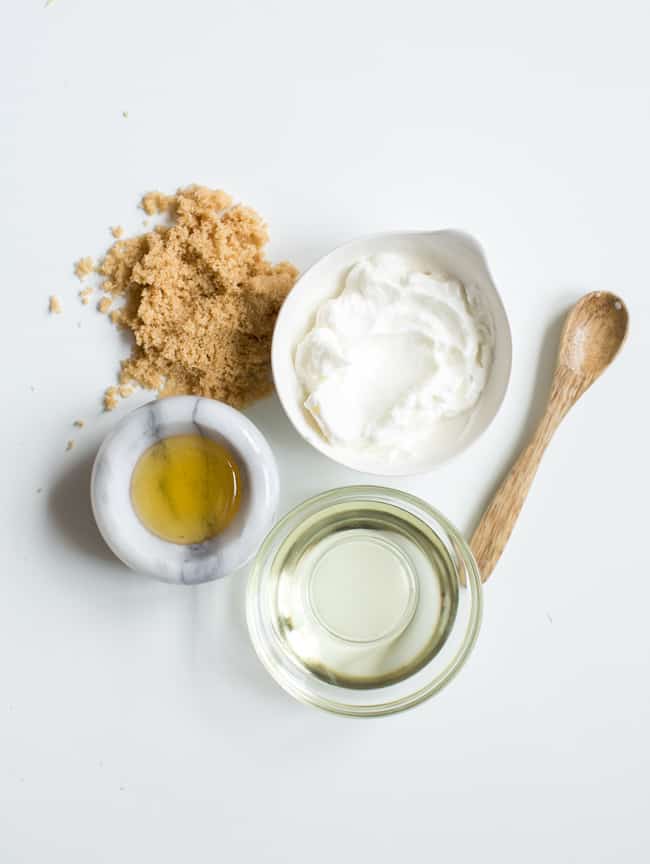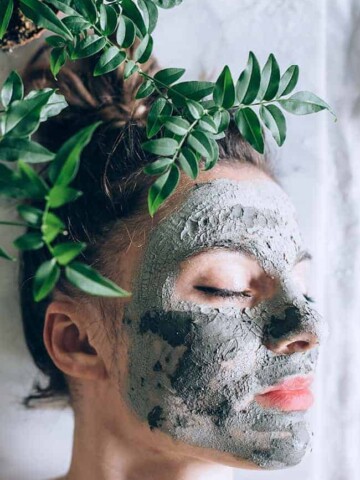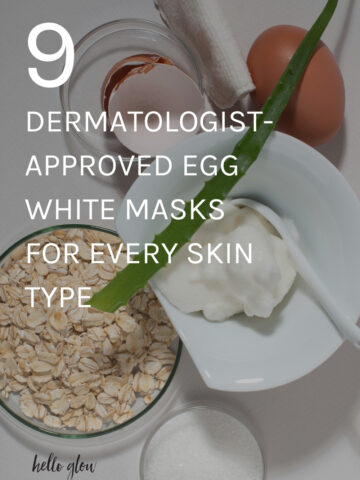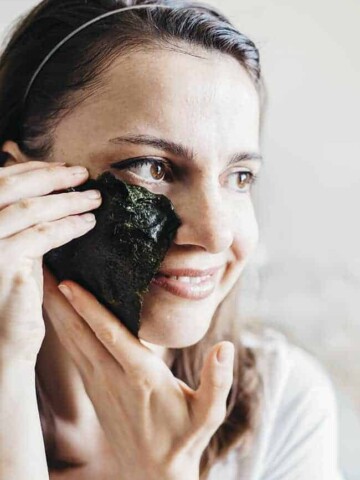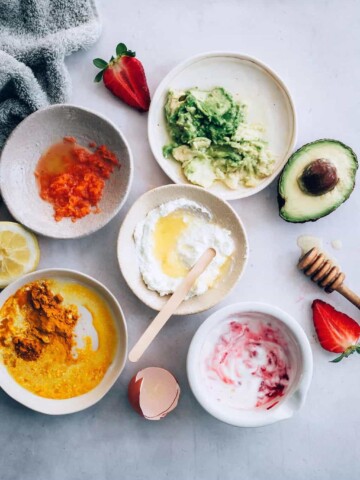Find out how a DIY probiotic face mask can help you win the battle against breakouts—and get 10 recipes to try at home. A yogurt face mask can be as simple as one or two ingredients, most of which you probably already have on hand in your kitchen!

Sometimes the best ingredients for your skin are the easiest to find. We've all seen commercials about how the probiotics in yogurt are good for our tummies. But those good bacteria are doing more than just improving your gut health.
Jump to:
- Skin Benefits of Probiotics
- Ways to Include Probiotics in Face Masks
- Homemade Probiotic Face Mask Recipes
- 1. Kefir Probiotic Mask for Oily Skin
- 2. Probiotic Yogurt Face Mask for Dry Skin
- 3. Probiotic Clay Mask for Combination Skin
- 4. Yogurt + Cucumber Face Mask for Sensitive Skin
- 5. Turmeric Probiotic Mask for Acne
- 6. Brightening Yogurt Face Mask for Glowing Skin
- 7. Probiotic Avocado Anti-Aging Mask
- 8. Yogurt + Coffee Exfoliating Mask
- 9. Brown Sugar Probiotic Body Scrub
- 10. Protein Hair Mask
- How To Do a Probiotic Mask At Home
- FAQ
Skin Benefits of Probiotics
Doctors are now using probiotic supplements and yogurt to treat acne and rosacea [source]. And those live active cultures are not just showing promise on the inside. When the digestive tract gets out of balance, the immune system responds, creating internal inflammation that can break down collagen and trigger skin eruptions.
Research is beginning to substantiate a connection between the bacteria living on the skin and chronic skin conditions like acne [source]. When used topically, some probiotic strains have been shown to kill the acne-causing bacteria hiding in your pores [source].
Probiotic face masks help restore the natural balance of your skin's microbiome, which can enhance your skin's barrier function, reduce inflammation, and improve acne-prone skin.
Ways to Include Probiotics in Face Masks
Yogurt is a versatile probiotic-rich base for DIY face masks, but it's not the only way to get a natural dose of beneficial bacteria.
Try these natural probiotic-rich ingredients in homemade face masks:
1. Probiotic Capsules
- How to Use: Open a probiotic capsule and mix the powder with your usual face mask ingredients. This is a straightforward way to boost any mask with the benefits of probiotics.
- Benefits: Directly adding probiotic powder ensures that live cultures are applied to your skin, potentially helping to restore balance and combat inflammatory conditions like acne and rosacea.
2. Kefir
- How to Use: Use kefir in place of yogurt in any mask recipe. Kefir contains even more strains of beneficial bacteria than regular yogurt.
- Benefits: Kefir is highly moisturizing and its probiotics may help reduce skin inflammation and improve hydration.
3. Sauerkraut Juice
- How to Use: Mix a teaspoon of sauerkraut juice into your mask mixture. Ensure the sauerkraut is naturally fermented and unpasteurized to retain probiotic benefits.
- Benefits: While it might sound unconventional, sauerkraut juice can help improve skin texture and possibly aid in detoxifying the skin.
4. Apple Cider Vinegar
- How to Use: Add a small amount of apple cider vinegar (ACV) to clay masks. Start with just a few drops to see how your skin reacts.
- Benefits: ACV contains prebiotics and has a small amount of probiotics from the "mother" of vinegar. It helps balance the skin's pH and reduce acne.
5. Prebiotic Ingredients
- How to Use: Although not probiotics, prebiotics feed the good bacteria on your skin. Ingredients like oatmeal, banana, or honey can be added to any mask to support skin's natural probiotics.
- Benefits: Prebiotics provide the necessary food for probiotics, helping to maintain a healthy skin microbiome.
6. Fermented Rice Water
- How to Use: Use fermented rice water as a liquid base for mixing dry ingredients like clay or oatmeal in a face mask.
- Benefits: Fermented rice water is rich in antioxidants and has properties that may help brighten and soften the skin.
Homemade Probiotic Face Mask Recipes
A probiotic face mask doesn't need to be complicated. Even just keeping it simple with all the natural goodness of yogurt, your skin will look and feel refreshed.
A simple 1-ingredient yogurt mask is perfect for reactive skin that needs a basic, no-nonsense mask. Using just plain Greek yogurt with live cultures and no preservatives, apply a thin layer to your face and neck and leave on for 15–20 minutes, then rinse off with warm water.
Want to get creative? Here are some probiotic-rich face mask recipes suitable for each skin type:
1. Kefir Probiotic Mask for Oily Skin
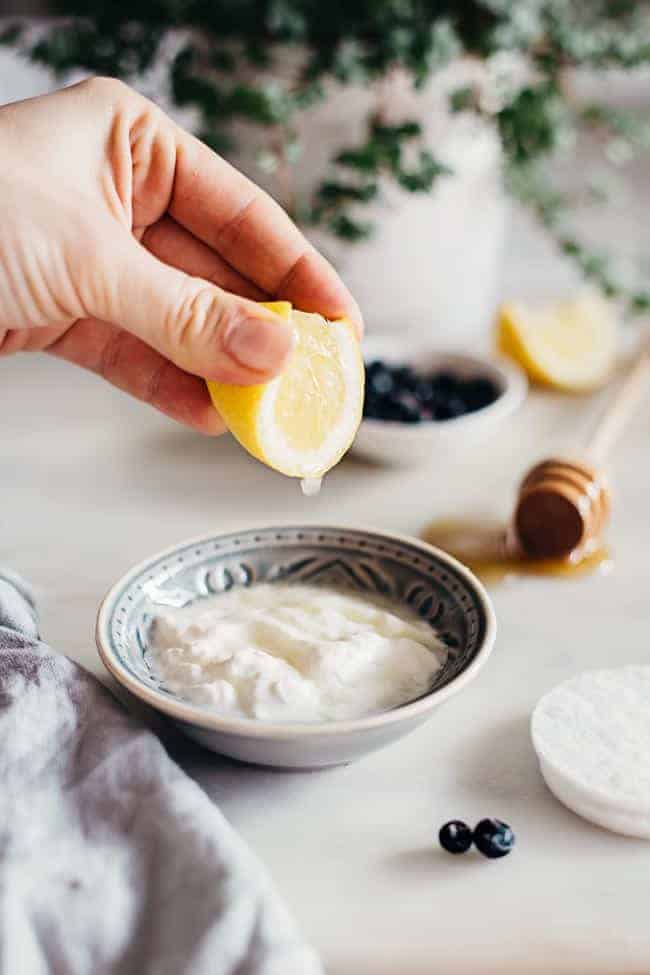
This simple mix of kefir, honey, and lemon juice controls oil and brightens your complexion. It's perfect for a nighttime pampering session to keep your skin smooth and glowing.
Lemon juice is rich in vitamin C and adds a little exfoliating boost to the yogurt to smooth skin and help control oiliness.
Honey is a hero skincare ingredient—it's a humectant, drawing moisture into the skin for a radiant boost. It has healing anti-inflammatory properties when used on the skin [source].
Ingredients
- 2 tablespoons plain kefir
- 1 tablespoon honey
- 1 teaspoon lemon juice
Instructions
Mix the kefir, honey, and lemon juice in a bowl. Apply the mixture to your face, avoiding the eye area. Leave it on for 10-15 minutes, then rinse off with lukewarm water.
This mask should be applied at nighttime since the lemon will make you photosensitive to the sun—or you can leave the lemon juice out.
2. Probiotic Yogurt Face Mask for Dry Skin
Nourish and soothe your dry skin with this hydrating trio of yogurt, olive oil, and honey. It's like a deep-conditioning treatment that leaves your skin feeling soft and supple.
Add a dash of olive oil and honey to moisturize and soothe dry skin.
Ingredients
- 2 tablespoons plain yogurt
- 1 tablespoon olive oil
- 1 tablespoon honey
Instructions
Combine all the ingredients until you get a smooth paste. Apply this mask to your face, and leave it on for about 15-20 minutes before rinsing with warm water.
3. Probiotic Clay Mask for Combination Skin
This mask is a multitasker that hydrates dry areas while keeping the oily zones in check. Bentonite clay cleans out your pores while apple cider vinegar masks balance the pH of your skin and knock out acne-causing bacteria.
The oatmeal helps to gently exfoliate and balance the skin's moisture levels, and it also works as a prebiotic to nourish and strengthen your skin's natural microbiome.
Ingredients
- 1 tablespoon bentonite clay
- 1 tablespoon oatmeal, finely ground
- 1 teaspoon apple cider vinegar
- 1–2 teaspoons water (adjust for desired consistency)
Instructions
Mix all ingredients except water in a small bowl. Add water until you reach a spreadable consistency.
Apply the mask to your face and leave it for 15–20 minutes. Rinse off with warm water.
4. Yogurt + Cucumber Face Mask for Sensitive Skin
Cool and calm sensitive skin with this gentle mask of yogurt, aloe vera, and cucumber juice. Aloe vera and cucumber are known for their soothing and cooling properties.
Together they're a soothing remedy that reduces irritation and refreshes your skin.
Ingredients
- 2 tablespoons plain yogurt
- 1 tablespoon aloe vera gel
- 1 teaspoon cucumber juice
Instructions
Blend the ingredients together until smooth. Apply the mixture to your face, leaving it on for about 15 minutes. Rinse with cool water.
5. Turmeric Probiotic Mask for Acne
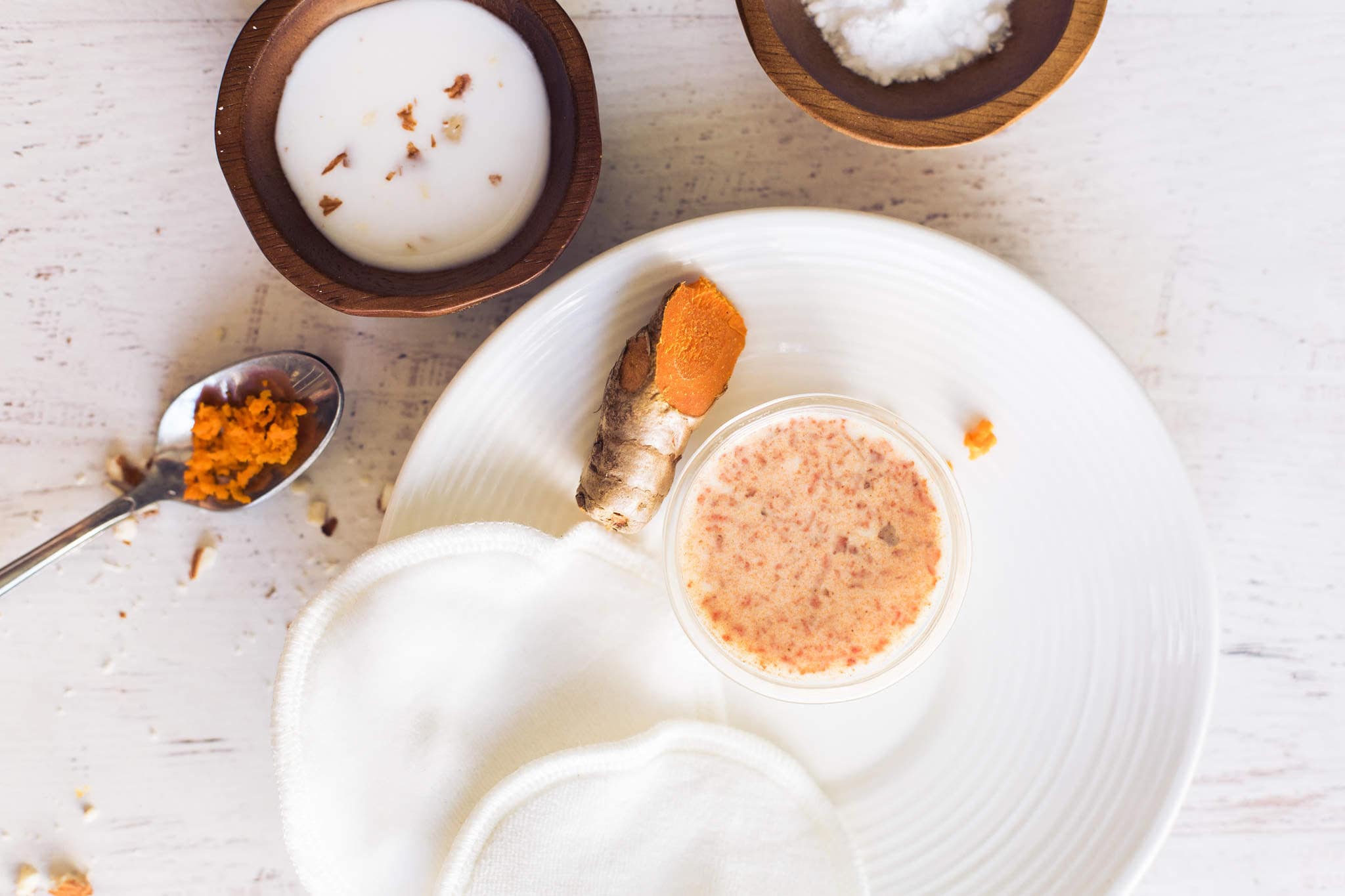
Fight breakouts with this anti-inflammatory mix of clay, rice water, and turmeric. Kaolin clay draws out impurities without over-drying, and rice water adds beneficial bacteria to promote skin healing. Turmeric masks are a simple solution for clearer, healthier skin thanks to the spice's natural anti-inflammatory properties.
Ingredients
- 1 tablespoon kaolin clay (suitable for sensitive acne-prone skin)
- 2 tablespoons fermented rice water
- ¼ teaspoon turmeric powder
Instructions
Mix ingredients in a small bowl. Apply the mask to your face, and let it sit for about 10-15 minutes. Wash off with cool water.
6. Brightening Yogurt Face Mask for Glowing Skin
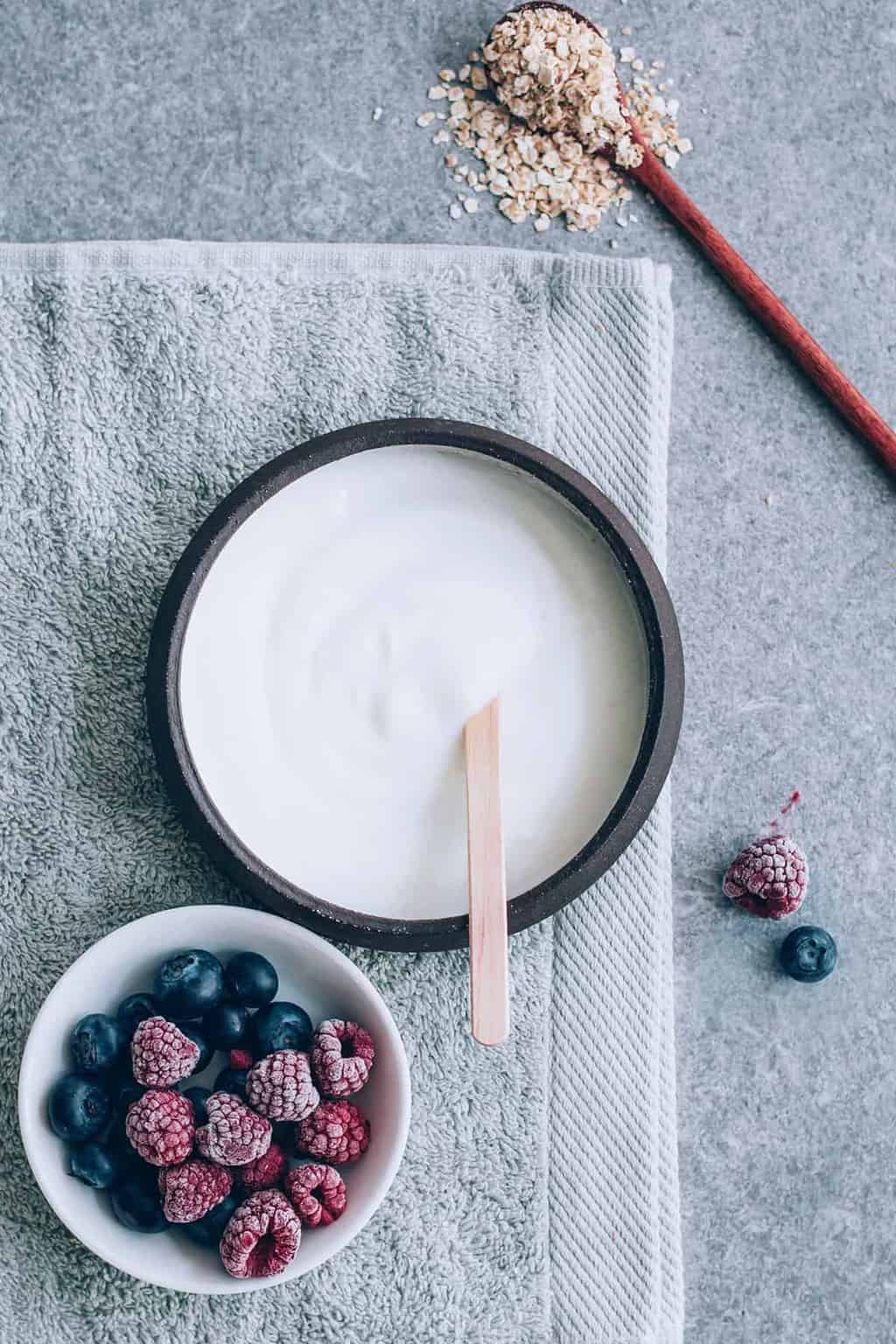
Get a full spectrum of skin benefits with a berry-powered mask that's packed with antioxidants and vitamins. It's no secret that berries are rich in all things good for us, and a mix of berries and probiotics is perfect for an all-around, effective mask.
- Strawberries are rich in vitamin C and folate [source], two essentials for healthy skin.
- Blackberries have a potent antioxidant combination of vitamin C and anthocyanin [source] that leave skin absolutely glowing.
- Blueberries are incredibly rich in vitamin C [source], an ingredient that appears in a lot of commercial serums to brighten dull skin and even out skin tone.
This creamy blend brightens and evens out your skin tone, leaving you with a natural glow.
- 2 tablespoons yogurt
- 1–2 teaspoons honey
- Squeeze of lemon juice
- Small handful of organic berries
Blend the ingredients together until you get a creamy paste, then liberally apply to your face and neck with a silicone brush or your fingers. Leave the mask on for 20 minutes, then wash off with warm water.
7. Probiotic Avocado Anti-Aging Mask
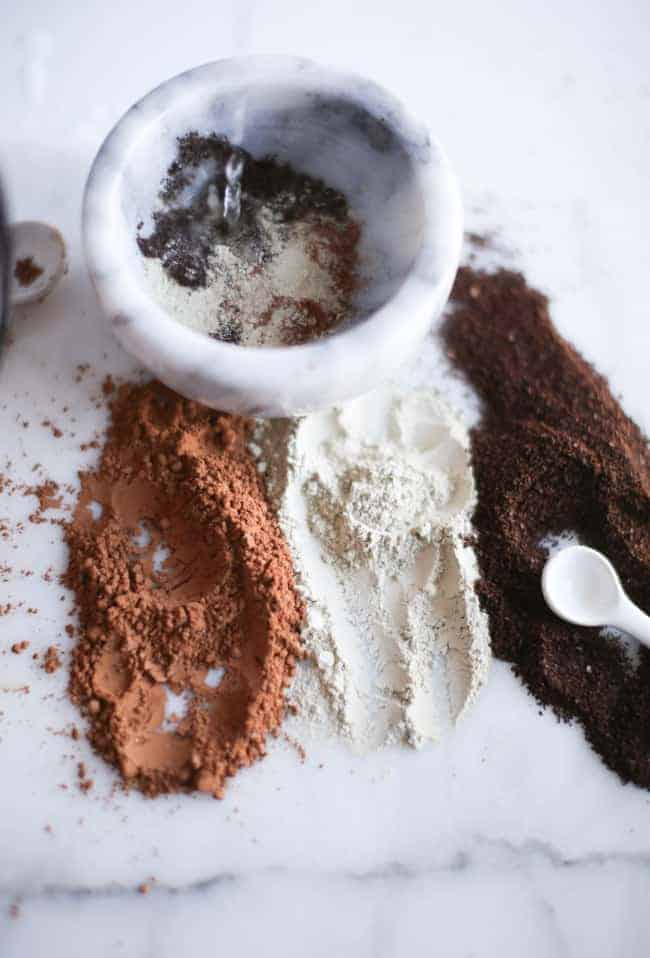
This anti-aging blend of avocado, cocoa powder, and probiotics is a treat for your skin, deeply nourishing and fighting off fine lines. Avocado is full of antioxidants and healthy fats, cocoa powder contains anti-aging properties, and probiotic powder delivers live cultures to your skin.
Ingredients
- 1 tablespoon mashed avocado
- 1 teaspoon cocoa powder
- 1 probiotic capsule
Instructions
Mix avocado and cocoa powder until you get a smooth paste. Open the probiotic capsule into the face mask paste and stir. Apply to the face and leave for 20 minutes before rinsing off.
8. Yogurt + Coffee Exfoliating Mask
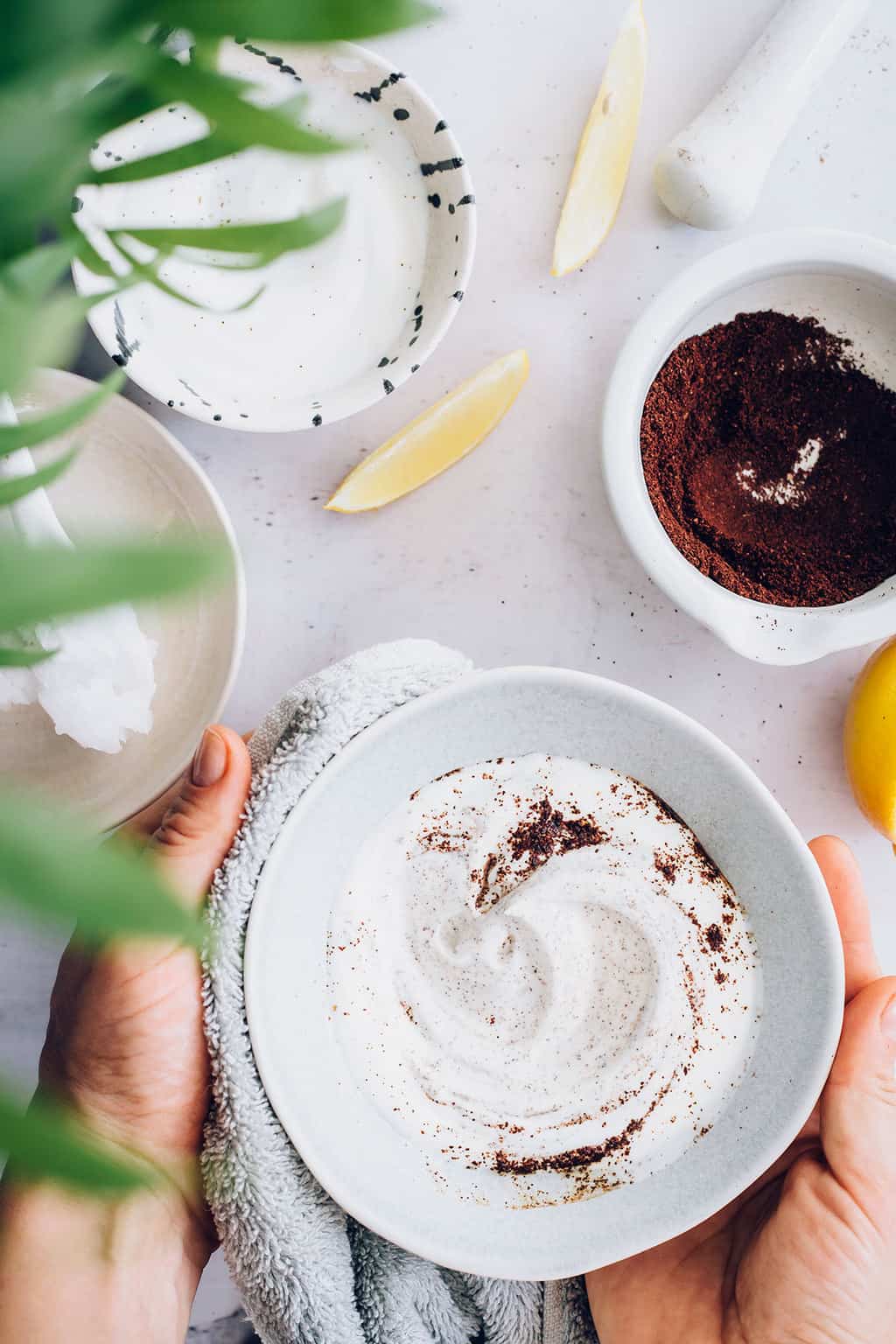
Give your face a wake-up call with a scrubby mix of yogurt, ground coffee, and honey that exfoliates and revitalizes tired skin. Coffee helps in exfoliating and rejuvenating the skin by removing dead skin cells, and the caffeine definitelly perks things up!
Fo a coffee face scrub the grounds should be super finely ground to avoid irritating your skin.
Ingredients
- 2 tablespoons plain yogurt
- 1 tablespoon finely ground coffee
- 1 teaspoon honey (optional)
Instructions
Stir together the yogurt, coffee, and honey. Apply to your face in a gentle circular motion to enhance exfoliation. Leave it on for about 10 minutes, then rinse with warm water.
9. Brown Sugar Probiotic Body Scrub
This probiotic-rich mix not only smoothens your skin but also enhances its natural barrier. Brown sugar granules gently exfoliate while the lactic acid in yogurt [source] dissolves dead skin. Olive oil and honey soothe and moisturize skin.
You can use this scrub on your body as well as your face if you go easy on the scrubbing.
Ingredients
- 1 cup brown sugar
- ½ cup olive oil
- ½ cup Greek yogurt
Instructions
Combine these ingredients in a small bowl and stir to combine. Use fingers to apply to clean skin. Massage into skin using circular motions and then rinse.
10. Protein Hair Mask
Strengthen and hydrate your hair with a protein-rich mask of kefir, honey, and olive oil. The lactic acid cleanses the scalp, while the proteins nourish and strengthen the hair. Honey and olive oil both lock in moisture and prevent dryness.
Ingredients
- 2 tablespoons plain kefir
- 1-½ tablespoons raw, organic honey
- ½ teaspoon olive oil
Instructions
Combine all the ingredients in a bowl. Massage into your scalp and work through to the ends, leaving the mask on for at least 15 minutes before shampooing.
How To Do a Probiotic Mask At Home
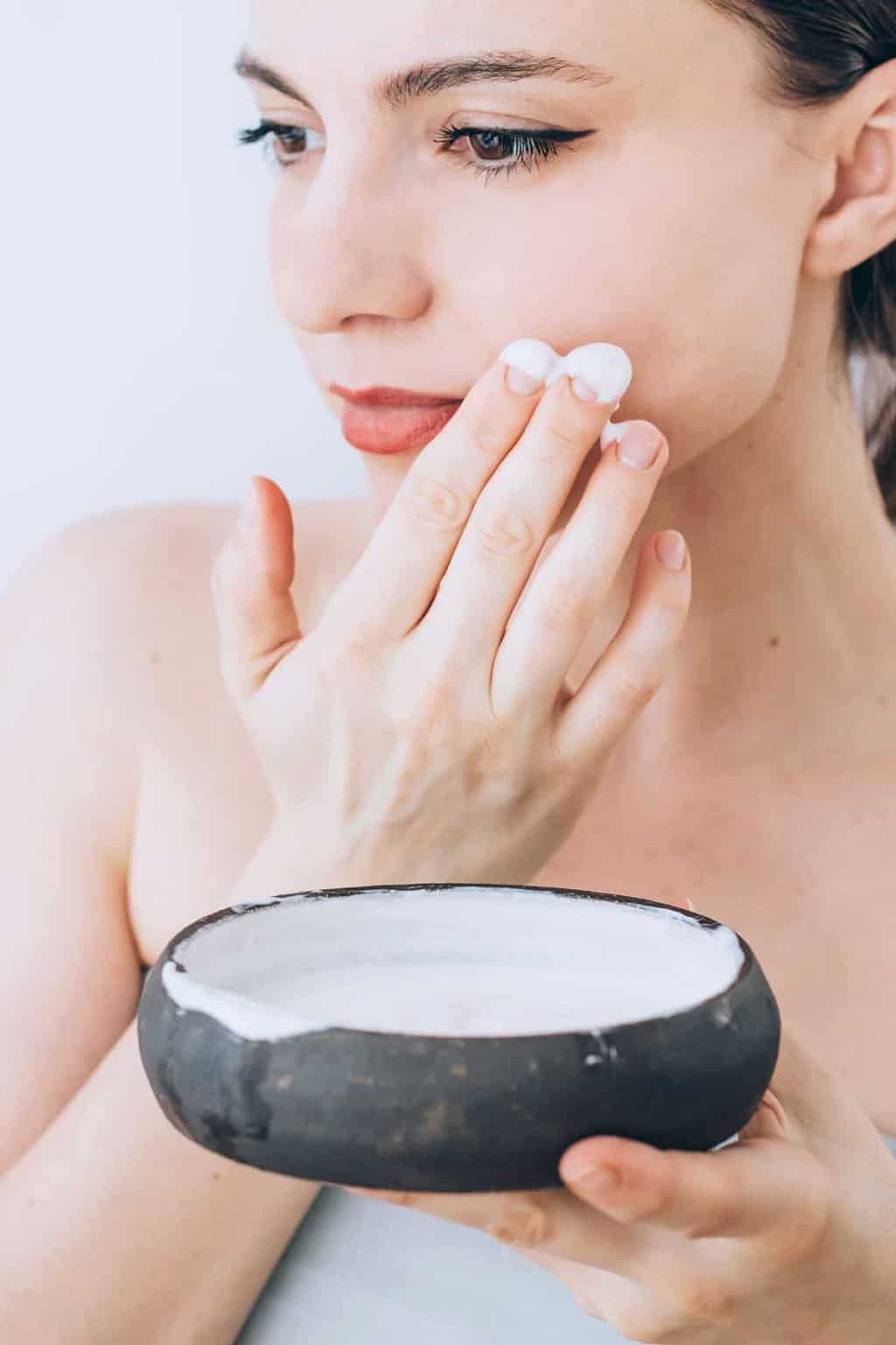
Here's a quick rundown of how to get the most out of your at-home face mask routine:
Cleanse your face: Begin with a clean face. Remove all makeup and wash your face with your regular cleanser to ensure the mask can fully penetrate your skin.
Simple probiotic mask formula: Start with a base of plain, unsweetened yogurt or kefir. Preferably organic and full-fat for more moisturizing benefits.
- For oily skin: Add a few drops of lemon juice or 1 teaspoon raw apple cider vinegar. Lemon helps reduce excess sebum while ACV balances pH.
- For dry skin: Mix in a teaspoon of carrier oil or honey to add extra moisturizing properties.
- For acne-prone skin: Add a ¼ teaspoon of turmeric, a spice known for its anti-inflammatory properties which can help reduce acne redness and swelling.
Apply the mask: Using your fingers or a soft brush, apply the mask evenly across your face. Avoid the eyes and mouth areas.
Leave it on: Let the mask sit on your skin for about 15-20 minutes. This allows the active ingredients to nourish and hydrate your skin.
Rinse off: Wash the mask off with warm water, using gentle circular motions to give your face a light massage as you remove the mask.
Dry and moisturize: Pat your face dry with a soft towel and follow up with your favorite moisturizer to lock in hydration.
Repeat: Be consistent. These masks can be used once or twice a week to help maintain smooth, healthy-looking skin.
FAQ
You can mix probiotic capsule contents or probiotic-rich ingredients like yogurt or kefir with your clay mix.
Using a probiotic face mask once or twice a week is sufficient for most people. This frequency supports skin health without overloading the skin with active ingredients.
It's best to use plain, unsweetened yogurt with live active cultures. Full-fat yogurt is recommended for its moisturizing properties, but any yogurt with live cultures provides the probiotic benefits.
This article was medically reviewed by Dr. Gina Jansheski, a licensed, board-certified physician who has been practicing for more than 20 years. Learn more about Hello Glow's medical reviewers here. As always, this is not personal medical advice and we recommend that you talk with your doctor.
108
